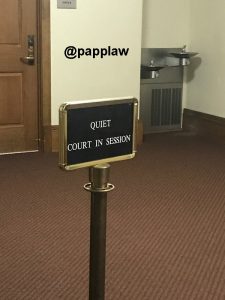 “Private” Facebook Posts are “Private”
“Private” Facebook Posts are “Private”
FACEBOOK, INC., Petitioner, v. THE SUPERIOR COURT OF SAN DIEGO COUNTY, Respondent; LANCE TOUCHSTONE, Real Party in Interest – (9/26/17)
Here, in Facebook v. Touchstone, a subpoena seeking to obtain “private” Facebook information is at stake. In this regard, real party in interest Lance Touchstone is awaiting trial in respondent San Diego County Superior Court (the trial court) on a charge of attempting to murder Jeffrey R. (the victim). (Pen. Code, §§ 664/187, subd. (a).) After the shooting incident, the victim has been active on his personal Facebook, Inc., (Facebook) account. He posted updates of his physical recovery from the hospital, requesting private messages over the Facebook messaging system. On the public portion of his Facebook page that is visible to all Facebook users, the victim posted updates of court hearings in this case, asking his friends to attend the preliminary hearing. In public posts the victim also discussed his personal use of guns and drugs, and described his desire to rob and kill people.
Believing nonpublic content of the victim’s Facebook account might provide exculpatory evidence helpful in preparing for trial, Touchstone served petitioner Facebook with a subpoena for the subscriber records and contents of the victim’s Facebook account, including timeline posts, messages, phone calls, photos, videos, location information and user-input information from account inception to the present date. Facebook filed a motion to quash the subpoena on the ground the Stored Communications Act (SCA) (18 U.S.C.2 § 2701 et seq.) prohibited disclosure of the victim’s account contents. In an accompanying declaration, counsel for Facebook stated that Touchstone could obtain the requested contents directly from the victim or by working with the prosecutor to obtain a search warrant based on probable cause. Touchstone opposed the motion on the grounds he had a plausible justification for requesting the contents of the victim’s account, he should be allowed to obtain the contents because law enforcement could do so by a search warrant, his constitutional right to a fair trial trumped the SCA, and he could not obtain the contents from other sources because the victim was uncooperative and the prosecutor had not obtained a search warrant. At oral argument, defense counsel represented that the prosecution refused to issue a search warrant for the material and that she has been unable to locate the victim to serve him with a subpoena. The trial court denied the motion to quash and ordered Facebook to produce the contents of the victim’s account for in camera inspection by a certain date.
In the end, the Court held, “The SCA expressly prohibits electronic communication service providers from “knowingly divulg[ing] to any person or entity the contents of a communication.” (§ 2702(a)(1).) This statutory prohibition is subject to limited exceptions, none of which apply. (§ 2702(b)(1)-(8).) As we have discussed, Touchstone’s constitutional challenges to the SCA lack merit. Accordingly, the supremacy clause (U.S. Const., art. VI) prohibits enforcement of the trial court’s order because “California’s discovery laws cannot be enforced in a way that compels [a provider] to make disclosures violating the [SCA].” (Negro v. Superior Court, supra, 230 Cal.App.4th at pp. 888-889.).”
Until the California Supreme Court finally decides the matter in Facebook1, which is pending before the High Court, Facebook “private” information will remain private.
Visit: www.ca-nvlaw.com
